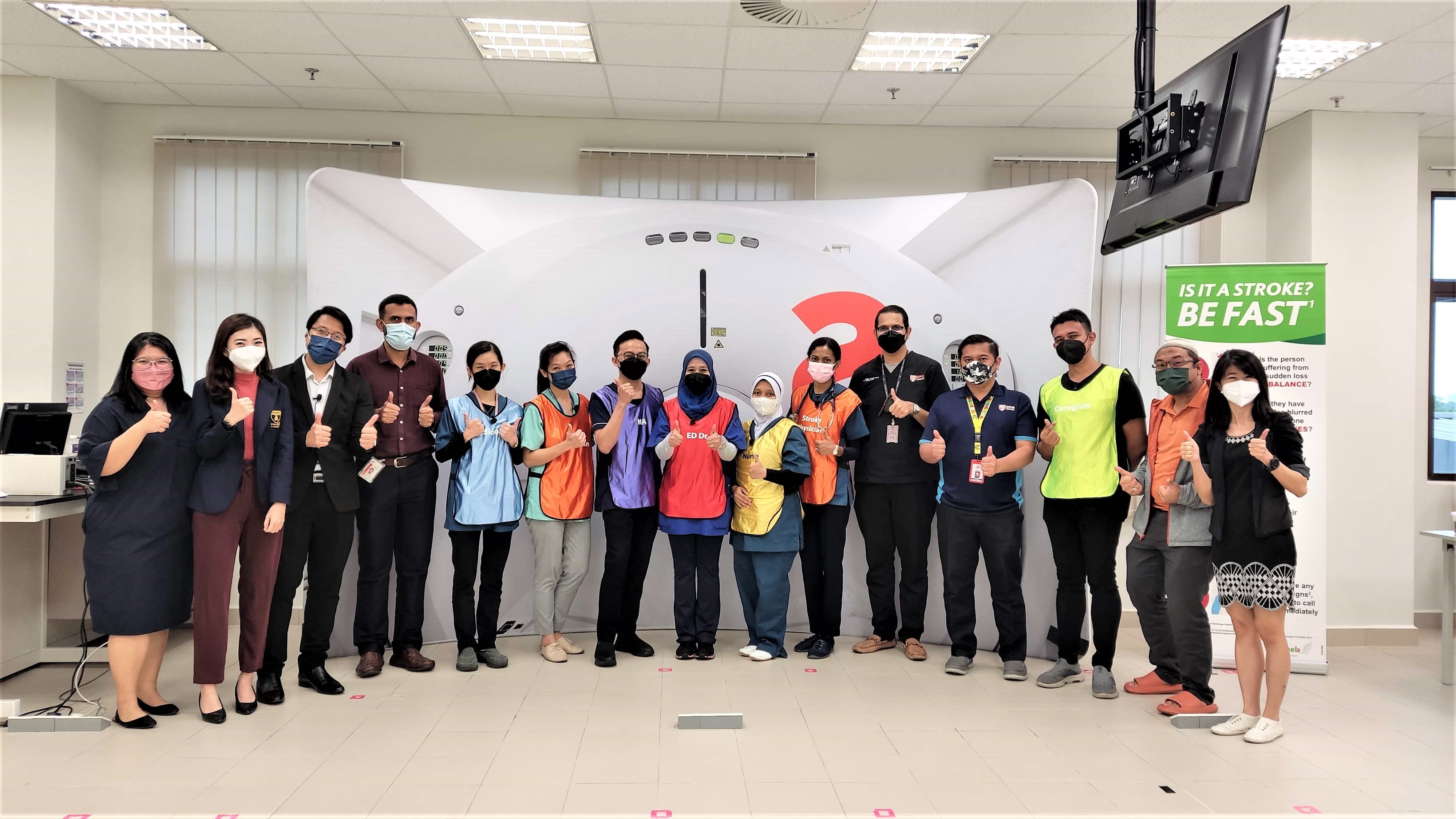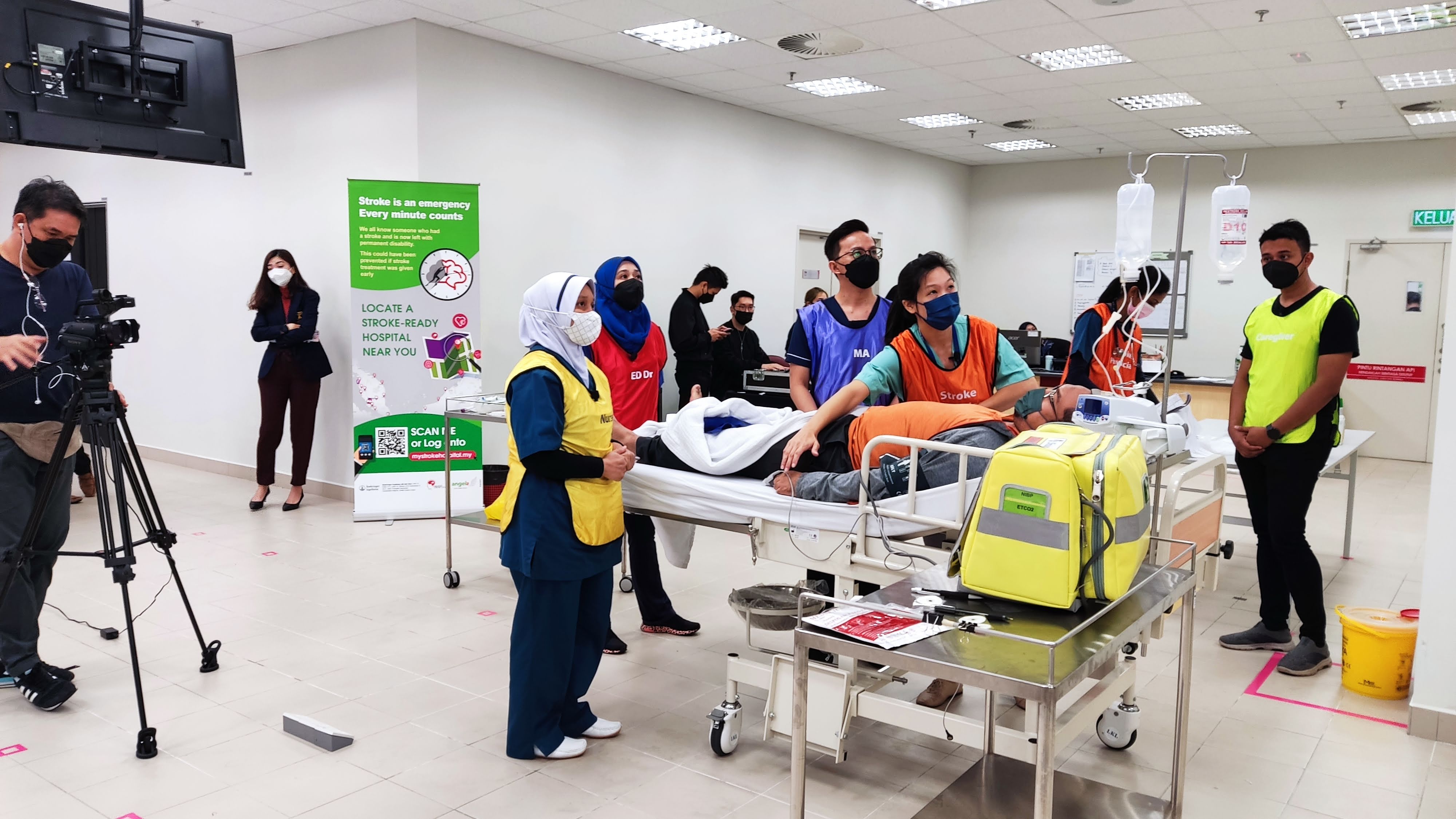
ATLET jarang menetapkan catatan selama pelatihan. Ini karena manusia membutuhkan kompetisi untuk menguji batas kemampuan kita. Persaingan meningkatkan upaya, meningkatkan kinerja, dan memicu kreativitas. Ini mengingatkan anggota tim yang sama bahwa mereka semua bekerja menuju sasaran yang sama dan memotivasi mereka untuk sukses bersama.
Hal ini juga berlaku bagi tim stroke seperti halnya tim olahraga, demikian kata tim Angels di Malaysia. Pada bulan Maret 2022, mereka mengundang tiga rumah sakit untuk bertarung dalam Tantangan Tim Simulasi yang akan, untuk pertama kalinya, memanfaatkan manfaat kompetisi ramah dalam upaya meningkatkan perawatan stroke di Malaysia.
Tujuannya, ujar konsultan Angels dan manajer program perawatan stroke Elva Phan, adalah untuk mengidentifikasi kesenjangan dalam alur di rumah sakit dan menciptakan skenario di mana tim dapat saling belajar. Mereka berharap persaingan akan menghasilkan tingkat kinerja yang lebih tinggi, memperkuat hubungan dalam tim, dan menyulut semangat tim.
Tantangan Tim Simulasi perdana adalah kontes tiga arah antara rekan-rekan yang berlangsung di pusat simulasi Rumah Sakit Pengajar UPM (HPUPM) di Serdang, sekitar 30 menit di selatan Kuala Lumpur. Di dalamnya terdapat HPUPM, yang pada tahun 2020 menjadi pusat stroke volume tinggi pertama di Malaysia dengan unit darurat stroke khusus dan pada tahun 2021 memenangkan penghargaan Angels Diamond WSO pertamanya. Yang paling tidak sama dengan mereka adalah Rumah Sakit Tuanka Ja’afar yang dua kali memenangkan penghargaan Diamond, dengan tim stroke yang berhasil menapaki rata-rata waktu door-to-needle kelas dunia selama 25 menit di puncak pandemi, dan Rumah Sakit Sultanah Zahirah dari kota pesisir, Kuala Terengganu.

Kompetisi dimulai pukul 08.30 pada hari Jumat, 4 Maret ketika tim diberi tahu oleh fasilitator, Drs Abdul Hanif Khan, dan dipimpin oleh kepala hakim, pemenang Spirit of Excellence 2022 Dr. Wan Asyraf Wan Zaidi, ahli neurologi dari Rumah Sakit Canselor Tuanku Muhriz UKM. Mereka semua harus menangani kasus dugaan stroke yang sama yang melibatkan seorang pria berusia 41 tahun dengan penyimpangan pandangan kanan dan penghinaan ringan yang diamati dalam dua jam sebelumnya. Kinerja mereka akan dicatat dan dievaluasi oleh empat juri, dengan hasilnya diumumkan dan didiskusikan di Workshop Multidisiplin Angels keesokan harinya.
Tim dapat memperoleh 25% dari masing-masing hal berikut: pendekatan jalur dan penilaian NIHSS, interpretasi CT, pengambilan keputusan, dan waktu door-to-needle, dengan bonus 10% diberikan untuk kerja tim dan keunggulan keseluruhan. Kriteria penilaian mencerminkan tindakan prioritas utama untuk manajemen alur stroke yang optimal. Misalnya, dalam evaluasi waktu door-to-needle, tim dapat memperkirakan kehilangan poin jika mereka memilih untuk menunggu pencitraan lebih lanjut setelah pendarahan dan penyumbatan pembuluh darah besar telah dikesampingkan, atau jika mereka memindahkan pasien ke unit gawat darurat alih-alih memulai pengobatan di CT.
Untuk tim yang berkompetisi, sore berikutnya tidak bisa segera tiba. Saat itulah peserta langsung dan online dalam Lokakarya Multidisipliner berkesempatan untuk melihat video simulasi dan setelah mendapatkan komentar dari Dr. Wan Asyraf Wan Zaidi, Dr. Abdul Hanif Khan akan mengumumkan hasilnya.
Tepuk tangan mengisi Auditorium HPUPM sebagai Rumah Sakit Tuanku Ja’afar terpilih sebagai pemenang Tantangan Tim Simulasi pertama Malaysia. Mereka juga telah mencatat waktu DTN terbaik dengan waktu 15 menit dan 56 detik, mengurangi HPUPM dengan waktu 17 menit dan 11 detik, dan Rumah Sakit Sultanah Nur Zahirah membesarkan bagian belakang dengan mengesankan 21 menit dan 48 detik.
Namun, pada akhirnya, menang lebih penting daripada pelajaran yang didapat setiap tim dari saingan mereka dan akan dibawa kembali ke rumah sakit mereka. Peserta lokakarya juga menikmati kursi baris depan pada sesi berbagi praktik terbaik.
Elva melaporkan bahwa dalam enam bulan setelah peristiwa tersebut, rata-rata waktu door-to-needle untuk pusat stroke yang berpartisipasi turun dari 64 menjadi 56 menit, dan bahwa rumah sakit kelompok lainnya telah mengisyaratkan minat mereka untuk mereplikasi kompetisi di pusat mereka sendiri.
Dewan Stroke Malaysia, yang presidennya, Associate Professor Hoo Fan Kee, menyampaikan pembukaan di workshop tersebut, juga menyadari potensi adanya tantangan tim berskala besar untuk meningkatkan kinerja tim stroke.
Dengan meningkatkan kualitas perawatan stroke di semua rumah sakit yang berpartisipasi, ini adalah kompetisi yang tidak akan menimbulkan kerugian, dan di mana pasien dan orang-orang yang mereka cintai adalah pemenang sesungguhnya.


